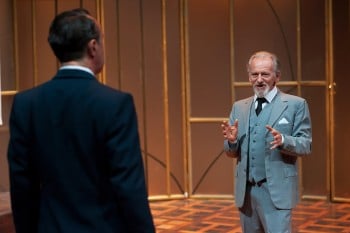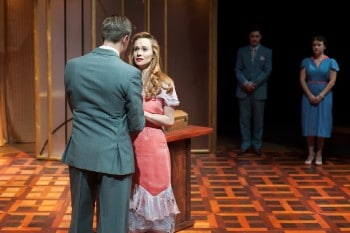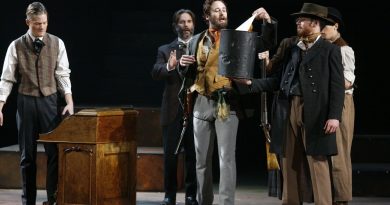Review: The Merchant of Venice — Sport for Jove
There’s a reason that Sport for Jove have so thoroughly caught the eye of critics and audiences in Sydney. Their fresh, open-hearted, contemporary approach to classics (largely Shakespeare) is appealingly unpretentious and intelligent without being stifling. The Merchant of Venice is their latest production, playing upstairs at the Seymour Centre, and it’s a blithe, seemingly careless affair that quietly works to upend the cruel prejudices at the play’s core.
It’s a well-known thing, because you can’t go two minutes without seeing someone tackle the Bard on stage: Bassanio (Chris Stalley) wants to marry Portia (Lizzie Schebesta), but to ask her hand he needs funds to get there. His merchant friend Antonio (James Lugton) agrees to guarantor his loan. Shylock (John Turnbull), the money lender sets his terms thusly: if Antonio defaults on the loan, he will re-pay Shylock with a pound of flesh. Antonio agrees. His ships are lost at sea. Shylock calls in the debt. They go to court.
You can’t really ignore it; the play is essentially about how all the good Christians triumph over the cruel Jew. Sure, there’s the “hath not a Jew eyes” speech that goes far in reminding people that those who are marginalised minorities are actually also people, but the play cuts Shylock down constantly, and he is neatly reprimanded and dealt with by the end.

In Sport for Jove’s production, it couldn’t be clearer as Gratiano (Damien Strouthos), young and largely likable, takes a boorish, in-your-face reading to “O Jew! an upright judge, a learned judge!” and his similar exclamations as final sentencing is delivered; it demonstrates something quite stirring about engrained, thoughtless prejudice in likable larrikins, especially in a country like ours, whose national pastime might as well be casual racism.
Playing Shylock as a sympathetic figure isn’t new, it’s been happening for over a hundred years, but in our current time and place it’s a poignant thing. Shylock’s court orders are to overturn his assets – giving half to the government and half to Antonio – and he must convert to Christianity. In Australia, generations of Indigenous children were stolen from their families and communities and forced to assimilate, taught Christianity and divorced from their own belongings and lives. Of course we understand that Shylock is persecuted. We know this kind of persecution in our own blood.
Jewish peoples in Elizabethan and Jacobean times would have been annexed into ghettos, clearly removed from society no matter how much they might have interacted with Christian populations; our country currently forbids refugees from entering our communities, choosing to keep them in sub-standard camps instead. Shylock resonates because we’re creating Shylocks all over the place; can you blame him for wanting a pound of flesh from Antonio, who does default on his loan?
Sport for Jove’s production isn’t set in Australia in 2015 (its Art Deco design and styling by Anna Gardiner suggests something closer to the sinister rise of Nazism) but it doesn’t need to be. It’s a welcome, sobering reminder, amidst all the genuine comedy, that Shylocks everywhere have been systematically stripped of their rights and belongings and dignities for decades, centuries, since time immemorial, in the name of Christian values and mercy.

But there is a lot of laughter. Aaron Tsindos as the Prince of Morocco, the puffed-up potential suitor of Portia’s, is laughably conceited, with any reference to his exoticism in the text contorted into a self-loving arrogance delivered with a pleasingly outlandish cadence. Portia and her maid Nerissa (Erica Lovell) are the brains of the operation, both in keeping suitors Portia doesn’t want away from her life, and, by the end of the play, keeping Antonio from death. The actors play it well, with a humming camaraderie between them.
Lugton is a rational, sincere Antonio, whose anti-Semitism is somewhat redeemed (but really, no, not really at all) by his generous offer to give his share of Shylock’s assets to Lorenzo, the Christian man Jessica has converted for and eloped with. Stalley’s Bassanio is warm and steadfast, which contrasts nicely with Schebesta’s whip-smart, playful Portia. Lucy Heffernan, as Shylock’s daughter Jessica, is well-worth watching – her choices are subtle but smart – particularly towards the end of the play, when’s all’s well seems to be ending well in privileged-majority land.
But the play belongs to John Turnbull. Brilliant, simmering with anger, principled and passionate. When he sharpens his knife on his shoe, the movements are so methodical and charismatic – just a knife on s a shoe! – that it’s difficult to look away. Shylock doesn’t get any ending that he deserves (pound of flesh grounds, reasonable, being ruined, less so), and that final indignity of forced conversion hits a nasty punch thanks to Turnbull’s meticulous movements, his small ritual and goodbye to his faith as everyone else rejoices.
Director Richard Cottrell moves the show along at a comedy clip; the tragedy happens in quieter moments, never missed or fully overshadowed, but never maudlin. It’s an invigorating take on the play, it’s clever and sophisticated. Where would we be without Sport for Jove? They’re a benchmark for excellence in the independent community.




